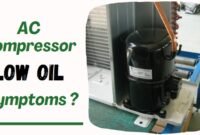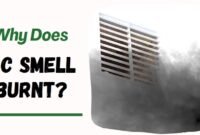The problem of why the AC compressor shuts off after 2-3 minutes happens to many people. As an owner, you expect your appliance to work every day and every time without any trouble. But, as an electrical machine, it is natural to have at least one problem coming up from it. If not, the years of use will eventually catch up.
The weary years of service could lead to this: You feel that it is just not right as you turn on the AC compressor. It goes on and off after a few minutes. This is called short cycling.
Short cycling is when the cooling cycle on the AC is shortened. It turns the AC on and off and makes the room temperature undecidable. To prevent this from happening in the future, read this article on why your AC automatically turns off and on.
The Reason Why AC Compressor Shut Off After 2-3 Minutes
If the AC only runs for 5 minutes and then goes off again, that is for one of these reasons:

Causes and Solutions for AC Compressor Short Cycling :
| Cause | Description | Solution |
|---|---|---|
| Overheating | Compressor shuts off to prevent damage due to high temperatures | Regular maintenance, clean coils |
| Low Refrigerant Levels | Insufficient refrigerant leads to inadequate pressure | Check and refill refrigerant |
| Electrical Issues | Faulty wiring or thermostat causing intermittent operation | Inspect and repair electrical components |
| Blocked Air Filters | Restricted airflow causes overheating and shutdown | Replace or clean air filters regularly |
| Thermostat Issues | Inaccurate readings from poorly placed thermostats | Optimize thermostat placement |
- The thermostat isn’t Working Properly
If an air conditioner has a problem with short cycling, it could be because of the thermostat. A broken thermostat can send the wrong signal to the AC compressor. The confused compressor then results in the whole home appliance short-cycling.
Expert Advice: Faulty wiring or a malfunctioning thermostat can lead to short cycling. Ensuring all electrical components are in good condition is crucial.
- The Thermostat is Wrongly Placed
The AC system relies on the thermostat to get the information to turn on and off. If the location of the thermostat is not proper, it could lead to a false temperature reading.
Personal Experience: I relocated my thermostat to a central part of the house, away from direct sunlight and drafts. This provided more accurate temperature readings and reduced short cycling.
Expertise Advice: Ensure the thermostat is placed in a location that accurately reflects the room’s temperature for optimal performance.
- Dusty Air Filters
The air filters are the AC parts that prevent dust from getting into the AC components. However, if the filter is dirty and full of dust, it may cause the components to overheat and cause the circuit to work improperly. You could clean the air filters regularly to prevent this from happening.
Research and Case Studies: Keeping air filters clean ensures proper airflow and prevents the compressor from overheating. A clean filter can improve efficiency and reduce the risk of short cycling.
- Condenser Coils are Dirty
If a condenser coil is dirty, it may cause the component to fail to trap the heat from the air inside. Therefore, overheating can happen. The same with the air filters. You can clean this part regularly to prevent an AC compressor from working badly.
From my experience, one of the most common causes of short cycling is an overheating compressor. This can happen if the unit is dirty or if there’s a refrigerant leak causing the compressor to work harder than it should.
Overheating can cause the compressor to shut down to protect itself from damage. Regular maintenance can help prevent this issue.
- The Refrigerator Leak
If there is a leak in this component, there will be confusion in the system. In the end, a short cycling trip will happen. This might be one of your answers to the question of why my ac automatically turns off and on. If so, you need to call a service center or a professional to fix this problem.
Research: Studies have shown that low refrigerant levels can cause the compressor to short cycle. This happens because the compressor doesn’t have enough refrigerant to maintain pressure, causing it to shut off prematurely.
The Effects of an AC Compressor Shutting Off After a Few Minutes
The effects on why the AC compressor is not working properly rely on your spending. If the short cycling goes on for quite a long time, it could shorten the air conditioner’s lifespan.
Read also: How to Fix Short Cycling Air Conditioner?
AC that can usually be used for years can now be broken up for less. The continuity of the short cycling in the AC compressor can also make your electricity bills go higher than before.
That is because of the constant on and off of the appliance. You will spend extra money to buy a new one and pay the bills if the problem does not go away immediately.
Conclusion
The solution to the problem of why does my AC compressor shut off after 2-3 minutes? is to repair it immediately at the service center. Short cycling usually takes several days to resolve. But, if repairing the air conditioner is not possible, you could purchase a new one for your household.


